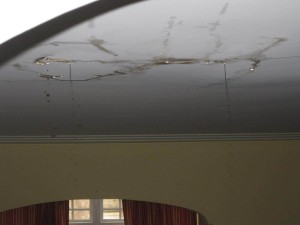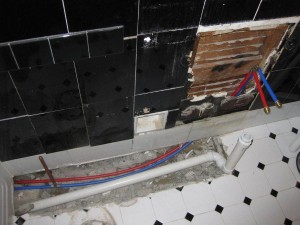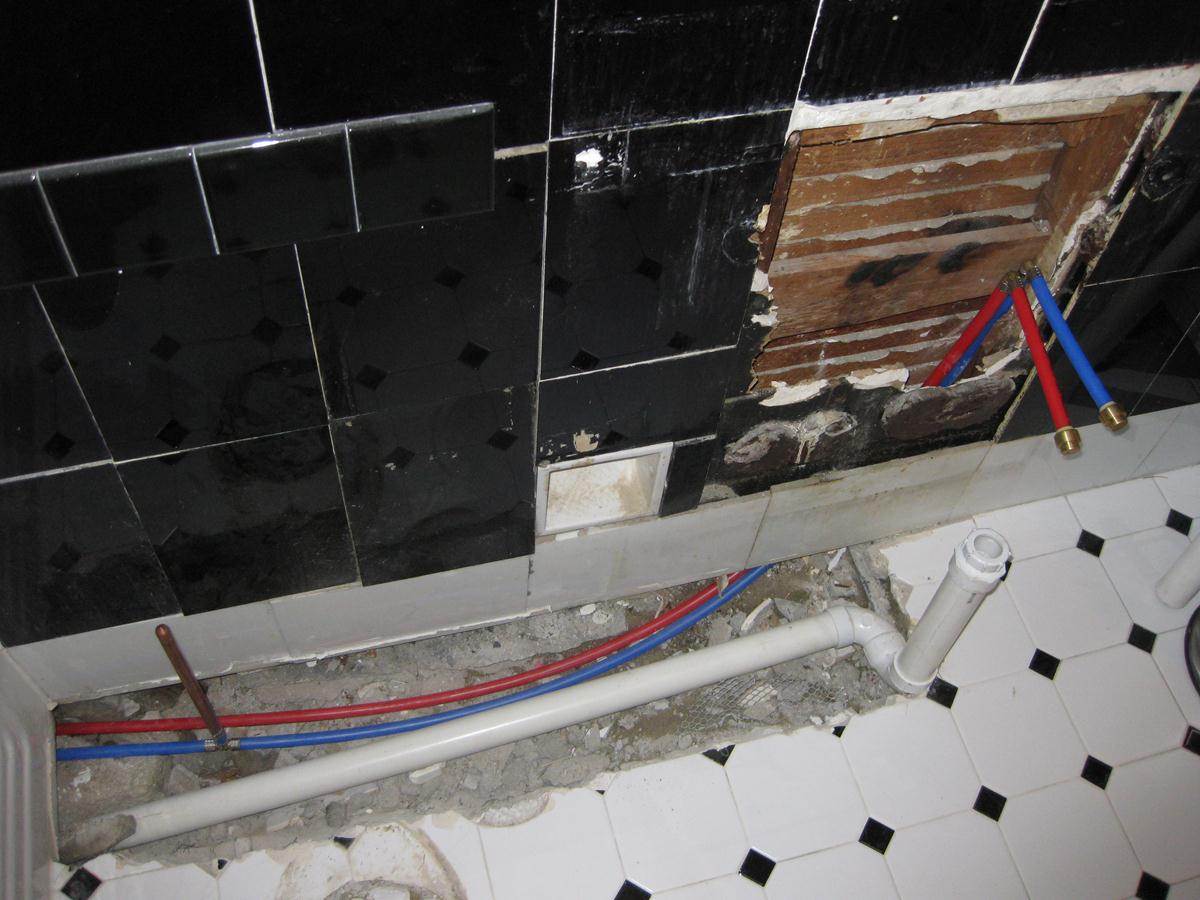by Dr. Joseph Barber
 In the midst of the recent holidays, water began pouring from the living room ceiling in my house, which had all of a sudden developed a serious case of “leaky pipe syndrome”. The original 1926 lead waste-water pipe in the bathroom sink had given up and lost its structural integrity, providing a novel way for us to water the Christmas tree. [Editor’s Note: Must be contagious. Reminds me of last Christmas in Career Services. – JMD] The professional plumbers we brought in to address this issue replaced the pipe…, but only after accidentally rupturing the hot water pipe supplying water to the sink. Since they hadn’t turned off the water at the mains, there was suddenly a lot more water pouring through the ceiling, leading to a case of extreme “leaky pipe syndrome”. The issue has now been resolved, you’ll be glad to know. The lead pipe has been replaced with PVC, and the copper pipes supplying the hot and cold water have now been replaced with flexible plastic ones
In the midst of the recent holidays, water began pouring from the living room ceiling in my house, which had all of a sudden developed a serious case of “leaky pipe syndrome”. The original 1926 lead waste-water pipe in the bathroom sink had given up and lost its structural integrity, providing a novel way for us to water the Christmas tree. [Editor’s Note: Must be contagious. Reminds me of last Christmas in Career Services. – JMD] The professional plumbers we brought in to address this issue replaced the pipe…, but only after accidentally rupturing the hot water pipe supplying water to the sink. Since they hadn’t turned off the water at the mains, there was suddenly a lot more water pouring through the ceiling, leading to a case of extreme “leaky pipe syndrome”. The issue has now been resolved, you’ll be glad to know. The lead pipe has been replaced with PVC, and the copper pipes supplying the hot and cold water have now been replaced with flexible plastic ones  (the ones that Mike Holmes on “Holmes on Homes” is always talking about, so they must be good. Oh Mike Holmes, why can’t you come down from Canada and fix up my house?!).
(the ones that Mike Holmes on “Holmes on Homes” is always talking about, so they must be good. Oh Mike Holmes, why can’t you come down from Canada and fix up my house?!).
This watery experience reminded me of a different type of leaky pipe that is much harder to address (even for Mike Holmes) – the so-called “leaky pipeline” of women in science. The essence of this issue is that despite there being a fairly equal number of men and women working through undergraduate and graduate science programs, there tend to be a greater proportion of men the further up the career ladder your go – both within academic and other research-focused career fields. The pipeline is leaky because there is a greater attrition of women over time. The NSF (2009) provides some evidence of this within academia in their study on “Women, Minorities, and Persons with Disabilities in Science and Engineering”, and some of the data from this study are summarized in the table below.
| |
% of women in BS programs |
% of women completing PhDs |
% of women as faculty members |
| Biology |
50-60 |
50 |
25 |
| Chemistry |
50 |
– |
13 |
| Chemical engineering |
30 |
25 |
10 |
As women still take on the majority of infant and child caretaking responsibilities, this is one of the main factors associated with attrition. Many other reasons have also been suggested for these leaks (Handelsman et al. 2005; Barrett 2010) including:
- Long-term family responsibilities and other work-life conflicts that disproportionately affect women (e.g., maternity leave, breastfeeding; care of elderly)
- Systematic inequities in pay and conditions of employment on the basis of gender
- Conscious and unconscious biases that reduce female hiring or funding
- Underrepresentation of women in leadership and decision-making positions
Biases exist that may affect both hiring and funding success. For the National Institutes of Health (NIH) career development awards in clinical research, Jagsi et al (2009) report that men tend to receive 25-30% more R01 funding than women. In terms of jobs, if fewer women reach senior positions, this by itself can have a trickledown effect on future generations of women coming through the system. Research has shown that there is a connection between the number of women faculty members at an institution and the future success of women students in the field (Trower & Chait 2002).
Obviously, the need or desire to take maternity leave, for example, should have no bearing on a person’s ability to generate good ideas, research, or teaching approaches in scientific fields (Justice 2009). Family commitments can contribute to longer times between publications, and fewer publications overall (Taylor et al. 2009), but there is no evidence suggesting that this decreases the quality of science produced, or the abilities of women to continue on and become leaders in their fields (Justice 2009).
What seems to be needed to address this issue is some flexibility. Like the flexible plastic pipes that now supply water to my bathroom sink, flexible career pipelines will ensure that women scientists can reach senior positions in their fields whether or not they have also invested time in their personal and family lives. There are some straightforward suggestions offered to help academic and research institutions increase flexibility for women and men (Chesler 2010), and these include:
- Implementing dual-career hiring programs
- Tenure clock extensions for childbirth, adoption, and elder care
- Flexible part-time option for tenure-track faculty with care giving responsibilities
- On-campus lactation rooms
- Access to high quality or university-sponsored child care facilities (including emergency backup child care facilities)
- Childcare options at academic conferences and symposiums
- Emergency funding available to support a faculty member’s research program when he or she is facing significant life cycle challenges, (e.g., birth of a special needs child or illness of a parent)
How likely these strategies are to be implemented is uncertain, especially when finances at universities and research facilities are tight, but they seem to make a lot of sense. In the meantime, it is worth being aware of some of these possible challenges that exist within academic and research fields when it comes to balancing work and life. Everyone will likely need to overcome some of these challenges at some point in their lives. For those of you perusing the academic path, you don’t want to be surprised by whatever the life-equivalent of water pouring out of the ceiling is, and you certainly want to be able to make sensible career choices with your eyes wide open. It is also worth remembering that men and women voluntarily leave the academic pipeline for many reasons, and go on to have successful, fulfilling careers applying their academic skills elsewhere. I don’t think of these as leaks. They are purposeful changes in career paths. The flexible pipeline has many branches and can take you to many different places – here are just some examples of alternative careers.
The references cited in this blog have more information on the leaky pipeline, and on approaches that currently exist to plug the leaks. There are also resources at Penn that you can turn to. Career Services co-sponsors a “Faculty Conversations” discussion series each spring semester, with support from the Associate Provost for Education. One of the topics often covered is work/life balance, where current faculty members talk about their own experiences, the challenges they have faced, and what they have done to cope. The Graduate Student Center also has a page of resources for graduate students who have children or are expecting children.
References:
Barrett J. 2010. Barriers to gender equality in US biomedical science. Physiol. Sci. 60: 232-234.
Chesler NC, Barabino G, Bhatia SN, Richards-Kortum, R. 2010. The pipeline still leaks and more than you think: a status report on gender diversity in biomedical engineering. Annals of Biomedical Engineering 38(5): 1928-1935.
Handelsman J, Cantor N, Carnes M, Denton D, Fine E, Grosz B, Hinshaw V, Marrett C, Rosser S, Shalala D, Sheridan J. 2005. Careers in science. More women in science. Science 309(5738): 1190-1191.
Jagsi R, Motomura AR, Griffith KA, Rangarajan S, Ubel PA. 2009. Sex differences in attainment of independent funding by career development awardees. Ann Intern Med. 151: 804-811.
Justice AC. 2009. Leaky pipes, Faustian dilemmas, and a room of one’s own: can we build a more flexible pipeline to academic success? Ann. Intern. Med. 151: 818-819.
National Science Foundation (NSF) (2009). Women, Minorities, and Persons with Disabilities in Science and Engineering. Division of Science Resources Statistics. NSF 09-305, Arlington, VA. Available at http://www.nsf.gov/statistics/wmpd/.
Taylor KS, Lambert TW, Goldacre MJ. 2009. Career progression and destinations, comparing men and women in the NHS: postal questionnaire surveys. BMJ 338: b1735. [PMID: 19493938]
Trower C, Chait R. (2002). Faculty diversity. Harv. Mag. 98: 33-37.
 Our very own David Ross, Associate Director for Wharton Undergraduate career counseling, was recently invited to be a guest blogger of the IMHO: In My Humble Opinion column at the Eye of the Intern blog, part of Internships.com.
Our very own David Ross, Associate Director for Wharton Undergraduate career counseling, was recently invited to be a guest blogger of the IMHO: In My Humble Opinion column at the Eye of the Intern blog, part of Internships.com.








